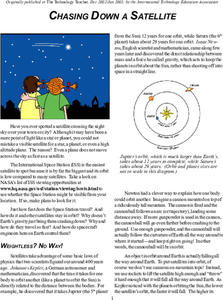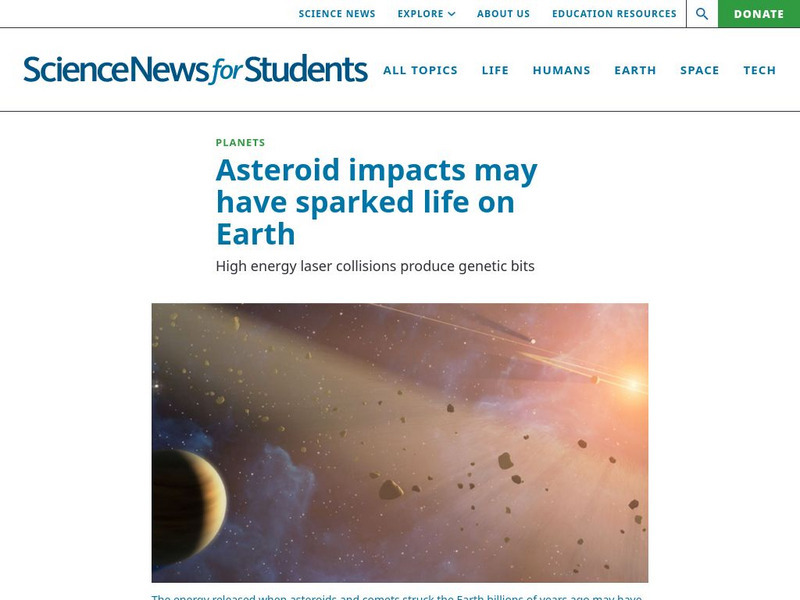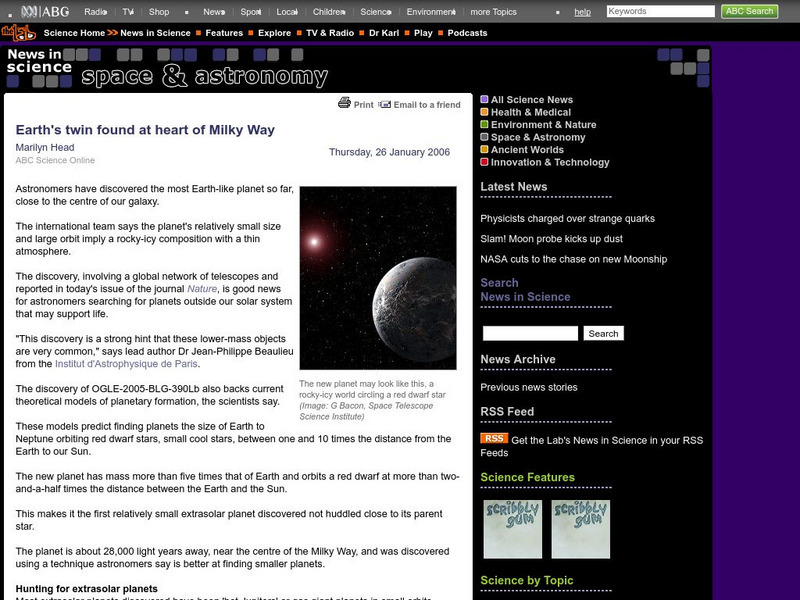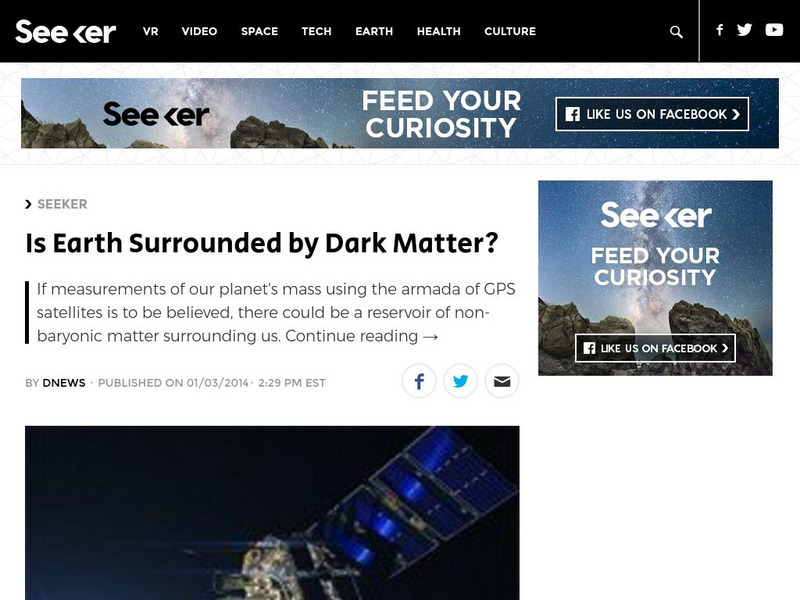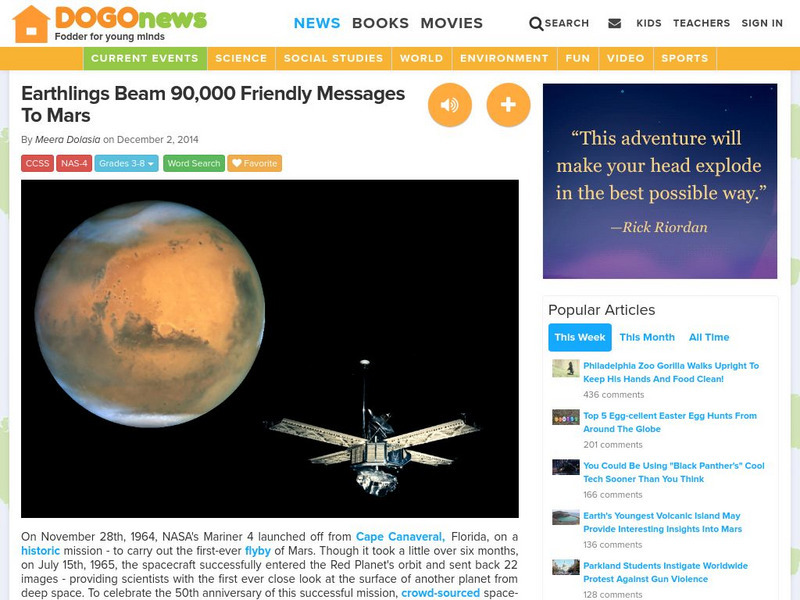NASA
Chasing Down a Satellite
Calculate the speed of the International Space Station. By reading the article, pupils learn about the concept of orbits. Scholars work through a formula to determine how fast the International Space Station is traveling to stay in...
NASA
Speaking in Phases
Hear from deep space. Pupils learn how satellites transfer information back to Earth. They learn about three different ways to modulate radio waves and how a satellite sends information with only 0s and 1s. Using sound, class members...
NASA
Keeping Nine Eyes on the Weather
Take a look at climate change from another angle. Readers learn about the MISR instrument on the Terra satellite and how it studies Earth. Pupils experience how the multiple cameras give scientists multiple views so they can better study...
NASA
Packing for a L-o-o-o-ng Trip to Mars
Pack just enough to fit. Crews determine what personal items to take with them on a trip to Mars. Each team must decide what to take with them on a two-and-a-half year trip to Mars and whether their items will fit within the allotted...
NASA
Taking Apart the Light
Break down light into spectra. Scholars learn how atoms emit and absorb photons and come to understand how this process allows scientists to identify different atoms based on either absorption lines or emission lines. Learners then...
Society for Science and the Public
Science News for Students: Asteroid Impacts May Have Sparked Life
Article reports on a new study that claims that the energy released from asteroid collisions may have sparked life on Earth. Includes a list of key vocabulary.
Other
Aaas Science News: Week of 2 24 14: Europe to Launch Hunt for Exoplanets
Article reports on the European Space Agency's upcoming program to search for exoplanet in space.
Other
Aas Science News: Possible Orphan Black Hole
Article reports on the discovery of a supermassive object 90 million light-years from Earth that may be an orphan black hole.
Society for Science and the Public
Science News for Students: So Many 'Earths'
Article reports on the recent discovery that many suns in the universe host "Earth-like" planets. Includes a vocabularly list.
Australian Broadcasting Corporation
Australian Broadcasting Corporation: News in Science: Earth's Twin Found at Heart of Milky Way
From ABC News in Science, Marilyn Head's article centers on research behind the discovery of the planet in the Milky Way which most closely resembles the planet Earth.
Society for Science and the Public
Science News for Students: Planetary Paparazzo
Discusses the information from the NASA spacecraft Messenger as it orbits Mercury and transmits photographs of the planet's surface to Earth.
Seeker
Seeker: Week of 1 6 14: Is Earth Surrounded by Dark Matter?
Article reports on a presentation that suggests that the Earth is surrounded by dark matter.
DOGO Media
Dogo News: Earthlings Beam 90,000 Friendly Messages to Mars
Article reports on recent mission by a private space company to beam messages to Mars from Earth. Includes video.
Australian Broadcasting Corporation
Australian Broadcasting Corporation: News in Science: Violent Storm Rages on Saturn
From ABC News in Science, Irene Klotz's article discusses the first storm in the history of the solar system (with the exclusion of storms on Earth) to develop a hurricane-like eye.
US Environmental Protection Agency
Epa: Causes of Climate Change
Earth's temperature depends on the balance between energy entering and leaving the planet's system . When incoming energy from the sun is absorbed by the Earth system, Earth warms. When the sun's energy is reflected back into space,...
BBC
Bbc Newsround: One in Five Suns Has Habitable World
Using the Kepler telescope, NASA scientists have estimated that one in five of suns in space host an Earth-like planet in what is called the habitable zone.
Society for Science and the Public
Science News for Students: Small but Wise
Describes the WISE Project, which has an infrared telescope orbiting the Earth taking photographs of never before seen areas of space.
Other
National Research Foundation: How Far? How Big? How Many?
Using light as our measuring stick in space, science site provides all types of fun facts using light years and seconds as a reference.
Other popular searches
- Earth and Space Science
- Earth Space Science
- Space Science on Earth
- +Earth and Space Science
- Earth Space Science Quiz
- Inquiry Earth Space Science
- Earth/space Science
